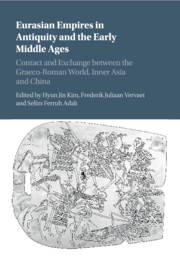 Eurasian Empires in Antiquity and the Early Middle Ages
Eurasian Empires in Antiquity and the Early Middle Ages Book contents
- Eurasian Empires in Antiquity and the Early Middle Ages
- Eurasian Empires in Antiquity and the Early Middle Ages
- Copyright page
- Dedication
- Contents
- Illustrations
- Maps
- Tables
- Contributors
- Acknowledgements
- Introduction
- Part I Political Organization and Interactions of Eurasian Empires
- Part II Socio-Institutional Aspects of Eurasian Empires
- 4 Honour and Shame in the Roman Republic*
- 5 Honour and Shame in Han China
- 6 Slavery and Forced Labour in Early China and the Roman World
- Part III Cultural Legacies of Eurasian Empires
- Part IV Archaeology of Eurasian Empires
- Conclusion
- Index
- References
5 - Honour and Shame in Han China
from Part II - Socio-Institutional Aspects of Eurasian Empires
Published online by Cambridge University Press: 12 October 2017
- Eurasian Empires in Antiquity and the Early Middle Ages
- Eurasian Empires in Antiquity and the Early Middle Ages
- Copyright page
- Dedication
- Contents
- Illustrations
- Maps
- Tables
- Contributors
- Acknowledgements
- Introduction
- Part I Political Organization and Interactions of Eurasian Empires
- Part II Socio-Institutional Aspects of Eurasian Empires
- 4 Honour and Shame in the Roman Republic*
- 5 Honour and Shame in Han China
- 6 Slavery and Forced Labour in Early China and the Roman World
- Part III Cultural Legacies of Eurasian Empires
- Part IV Archaeology of Eurasian Empires
- Conclusion
- Index
- References
- Type
- Chapter
- Information
- Eurasian Empires in Antiquity and the Early Middle AgesContact and Exchange between the Graeco-Roman World, Inner Asia and China, pp. 85 - 109Publisher: Cambridge University PressPrint publication year: 2017


